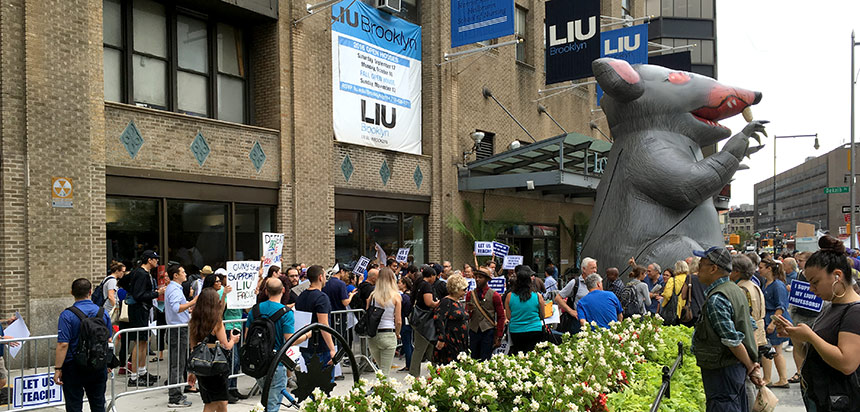On October 12th, I attended an illuminating (if depressing) talk from Emily Drabinski, the Coordinator of Library Instruction at Long Island University’s Brooklyn campus, on the ongoing struggle between LIU’s administration and faculty, particularly in the library department. Facing one of the few unionized faculties in private higher education, LIU has systematically sought to bust unions and cut employees to save money.
With the arrival of new president Kimberly Cline in 2013, LIU’s focus has narrowed to cutting costs and expanding the endowment by any means necessary. Two unionized campus organizations (its security and janitorial staffs) were removed and replaced by private firms, followed by widespread firing of non-union staff (including an employee with over fifty years at LIU who was fired during her vacation). Funds were transferred from the operating budget to the endowment, shifting the cost of vital resources to the faculty and slowing basic infrastructure projects.
LIU’s faculty union is the Long Island University Faculty Federation (LIUFF) which operates under the American Federation of Teachers (AFT). After negotiations with the administration fell through, LIUFF’s contract ended in August, leaving the faculty’s future uncertain. Over Labor Day weekend, the union faculty learned that they were being locked out, their syllabi taken and used by makeshift non-union replacements as classes began. Drabinski noted that on top of the wildly unethical informational theft this action entailed, it showed a deep disrespect for LIU’s students in assuming they wouldn’t notice such a radical change in courses.
While the lockout left librarians and professors without work and pay, it came with one benefit: locked out employees cannot legally be fired, allowing them to speak out without fear of immediate retaliation. With the support of students and AFT, LIU’s faculty vehemently fought back against the administration’s actions.

Letters were sent to the American Library Association and the Department of Education, each of which has the power to pull LIU’s library school accreditation; with help from the State Department, the administration eventually caved. The lockout ended on September 14th, weeks into the semester.
This solution is temporary, with a contract lasting only until May 31st, 2017. Lost pay is still being negotiated, with the administration offering uneven compensation among departments (librarians, for instance, were docked pay at a higher level than fellow faculty). These unequal wages evoke one of LIUFF’s many issues with LIU: its Brooklyn campus employees are, for no visible reason, paid less than their Long Island counterparts for the same work. Drabinski sees this as a tactic to divide the faculty, as those paid more might fear lowered salaries if they demand equal pay for those paid less.
Drabinski also noted, with some frustration, that individual power is limited, with actual negotiations dominated by ruling classes (LIU’s administration on one side, and AFT top brass on the other). Power can only be found in larger organizations, and a case like this in a smaller school than LIU, in an area with less press coverage than New York, would likely see the union forced to cave with little fanfare.
While Drabinski obviously presented this information from the perspective of herself and the union, further research more or less confirms her version of events. LIU’s story has been featured in the New York Times, the Atlantic, and the Nation, and continues to draw attention on campus and across unionized bodies. Since Drabinski’s talk, 14 union faculties in Pennsylvania state universities went on a three-day strike ending on October 21st; dissatisfaction between administrations and faculties is hardly an isolated incident.
While professors at a private institution don’t fit perfectly in Lipsky’s definition of a street-level bureaucrat (they aren’t government employees, which is a basic requirement), they fill an similar role to public school counterparts in function. LIU’s faculty certainly shares Lipsky’s dreary description of the job environment: resources are limited, their authority is routinely challenged, and job expectations are unattainably high. However, the faculty’s issues are not the direct fault of the government, but a private administration that severely underappreciates information laborers.
Note that information itself remains valuable to the administration: the library wasn’t shut down, and the course syllabi were stolen taken to maintain the flow of information to students. Even in lockout, LIU was ostensibly committed to an information-based service, one that is neither free nor inexpensive for its information-seeking patrons.
The discrepancy in respect given to information compared to information laborers could be a simple matter of pragmatism: information itself doesn’t demand equal wages or benefits, and seems cheaper than ever in the internet age. But it highlights a fundamental misunderstanding of information labor, lumping everyday acts of gathering information (as described by Downey) with professionals who make their living by keeping the wheel of information turning. If working in information is something that everybody does these days, what makes a school faculty so special? What makes the students—who are information laborers as well—worthy of well-paid librarians and professors?
Right now, the best case scenario for LIU’s faculty is that after the end of this school year, they get to keep working for an administration that frankly treats them like garbage. Information labor is routinely exploited, from capitalizing on unpaid labor (such as Facebook Likes or shared tweets) to content moderators paid below the poverty line, and as LIU shows, the mindset that information labor has minimal worth has ramifications even in ivory towers. The long-term solution is a shift in values, placing prestige in information labor itself in all its forms; until then, LIUFF’s struggle, and the struggle of their counterparts around the world, is bound to continue.
References:
Michael Lipsky, “Toward a theory of street-level bureaucracy”
Gregory Downey, “Making media work: time, space, identity, and labor in the analysis of information and communication infrastructures”